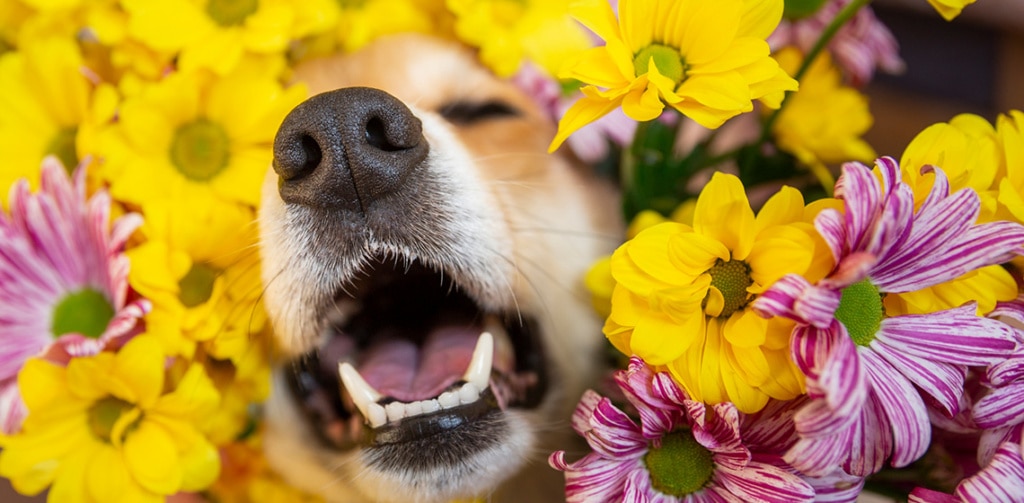If you click on links we provide, we may receive compensation.
Dog’s sneezing is normal, but if the sneeze is continuous followed by a runny nose, or if they’re producing mucus or blood from their nose, it could be something to worry about.
Severity:
Mild or severe, depending on the cause.
Table of Contents
Key points
- Sudden, severe, frequent sneezing will require a visit to the veterinarian
- Occasional sneezing is normal.
- If you see bloody discharge from the nose, or your dog is acting unwell, see a veterinarian straight away as it can be dog’s allergies or nasal infection.
- Foreign material, nasal mites, allergies, infections, and tumours can all cause sneezing in dogs.
- Your dog may need sedation or an anaesthetic to examine their nose to look for the cause
Common in:
Any dog, of any breed, age, and gender, can develop sneezing.
Dog Sneezing Symptoms and types:
As pet owners,if you notice your dog sneezing, it’s normal, it’s important to emphasize that this can be completely normal. However, if your dog starts sneezing more often, or has a sudden, severe episode of sneezing that doesn’t resolve, it could be a sign that they need to see a veterinarian.
Other symptoms to watch out for sneezing in dogs, that might be more concerning are if your dog starts acting unwell or is off their food, if they start sneezing blood or foul-smelling discharge from their nose, or if their breathing has become noisier.
In more severe cases you may notice breathing distress or a change in the shape of the dog’s nose or face.
Sometimes, the sneezing causes the foreign material to become dislodged and the sneezing resolves.
Understanding dog sneeze diagnostics
To determine the cause of dog’s sneezing, one of our veterinary team will first take a history from you, to find out when the sneezing started and any other symptoms, as well as identifying any potential triggers. They will then do a full examination, but focusing on the nose, eyes, throat, and lungs.
They may be able to recommend some treatment for your dog sneezes, or they might suggest some further tests to try to visualize what is causing the problem.
To make a diagnosis, your dog might need an x-ray, a scope (a camera passed into the nose), a swab, a blood test, or a biopsy, and some of these tests might require an anaesthetic or sedation.
Learning about the causes
1. Foreign material
It’s common for dogs to get grass seeds, grass blades, or other foreign objects lodged in their nasal passages and then frequent sneezing occurs.
Usually, if this is the case, your dog will suddenly seem very bothered by his nose, pawing at it, rubbing his face against things, and sneezing and snorting constantly as the dog’s nasal passages are irritated.
Sometimes, the sneezing in dogs causes the foreign material to become dislodged and the excessive sneezing resolves. However, if the object is stuck for a while you may see nasal discharge with pus or blood.
2. Infection
Dogs can get both bacterial and fungal infections (aspergillosis) of the nasal cavity. Your dog’s immune system will be impacted and they won’t stop sneezing until the infection passes.
If your dog has bacterial or fungal rhinitis you might notice he has a runny nose, and that the nasal discharge is bloody, contains pus, or is foul-smelling.
If the infection has been going on for a little while, your dog might go off his food or act unwell.
3. Allergy or irritation
Dogs can get inflamed nasal passages due to allergies, just like hay fever in people, which results in dog sneezing.
They can also get inflamed airways due to irritation from chemicals like household cleaners, air fresheners, essential oils, or even scented candles. If this is the case, you might not notice any discharge from the nose, and your dog might have sore or runny eyes too.
Thankfully, it’s unusual for this type of rhinitis to cause your dog to act unwell.
Since airborne allergens and irritants are common culprits, improving air quality can help. A Blueair Air Purifier removes dust, pollen, and household pollutants, providing relief for dogs with sensitive noses.

BLUEAIR Air Purifiers for Large Rooms, Cleans 3,048 Sqft In One Hour, HEPASilent Smart Air Cleaner For Home, Pets, Allergies, Virus, Dust, Mold, Smoke – Blue Pure 211i Max
11,617
$349
4. Tumors, growths, or polyps
Dogs can develop nasal tumors in their nasal cavity that can be either benign or cancerous.
The most common nasal cavity tumors are sarcomas and carcinomas, both of which can cause damage to the nose, mouth, or skull. Initially, there may be no symptoms at all, but as growth becomes larger it may cause nasal irritation, sneezing, or noisy breathing.
Over time the growth may also become infected, leading to blood or pus from the nose. In severe cases, you might notice a bulge or strange shape to the nose when looking at your dog.
If your dog suddenly starts sneezing more frequently or has other symptoms, you should arrange an appointment with your veterinarian.
Best treatment options for dog’s sneezing
Foreign material lodged in the nasal cavity can usually be removed fairly easily by a member of our veterinary team, although it usually requires an anesthetic or sedation. Once removed, medication might be required to settle any inflammation or infection.
If your dog has a bacterial or fungal nasal infections, then antibiotics or anti-fungal treatments are normally effective, as long as there is no underlying cause like a lowered immune system or a tumor.
Growths like polyps or tumors can sometimes be removed, depending on their location, or you may be offered a referral to a specialist team to discuss treatments like radiotherapy.
If the start of the sneezing coincided with you using a new carpet cleaner, or lighting a new scented candle, then this might be the cause. Try to prevent any further exposure and monitor your dog to see that the sneezing improves and resolves.
Home remedies and their effectiveness
The only situation where you can safely deal with your dog’s sneezing at home is if you suspect the cause is an airborne irritant or chemical, like air freshener or household cleaners.
If you think you can identify a potential cause that could have triggered the sneezing, try removing it from your dog’s environment and see if they stop sneezing.
When to see a vet
If your dog is sneezing but seems well, with no other symptoms, you could wait a few days to see if they improve. If the sneezing doesn’t clear up, or they’re acting a bit under the weather, it would be sensible to arrange an appointment for a check over. However, if the sneezing is severe, their breathing is affected, or they have a bloody nasal discharge, it is definitely worth giving us a call to arrange an urgent appointment.
FAQ
Occasional sneezing is normal. However, if your dog suddenly starts sneezing more frequently or has other symptoms, you should arrange an appointment with your veterinarian.
If your dog has other symptoms as well as sneezing, or they are acting unwell, it would be sensible to take them to the veterinarian. However, if they are constantly sneezing, sneezing blood, having nose bleeds, or in breathing distress, you should make an urgent appointment.
There are no effective home remedies for sneezing, but if you think you know the trigger, you may be able to help. If you have recently started using a different cleaning product or air freshener, this could be the cause so it’s worth preventing any further exposure and monitoring your dog to see if their sneezing improves. If your dog doesn’t improve, or they are acting unwell, you must arrange an appointment with a veterinarian.
If your dog is suffering from a viral or bacterial upper airway infection you may notice sneezing, coughing, and runny or sore eyes. They may be acting well, or they may be a bit off their food or under the weather. Beware that upper airway infections in dogs can be contagious.
If your dog only sneezes occasionally or has always sneezed to an extent, this is unlikely to be anything to be concerned about. It is only when the pattern of sneezing changes or is accompanied by other symptoms that you should seek veterinary advice.

Dr. Hannah Godfrey MRCVS graduated from the Royal Veterinary College in 2011. Although she initially worked in mixed practice treating all species, she found a love for small animal work and has worked exclusively with dogs and cats since 2014. She lives in Wales with her partner, son, and two cats (named Poppy and Ashton Kutcher), and writes comedy fiction in her spare time.








